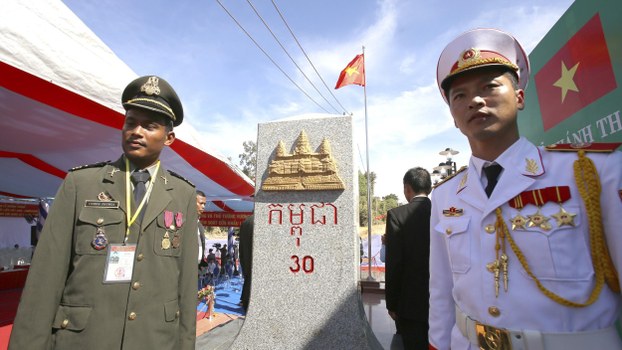




Cambodia’s King Norodom Sihamoni has put into effect a treaty that would complete the demarcation line between Cambodia and neighboring Vietnam, drawing criticism from opponents of Prime Minister Hun Sen who say the move violates the country’s sovereignty.
The supplementary treaty of 2019 on border posts was signed by Hun Sen and his Vietnamese counterpart Nguyen Xuan Phuc in early October. It recognizes the legality of two documents, a 1985 supplemental protocol and a 2005 agreement on border demarcation, thereby solidifying the demarcation of 84% of the border.
The promulgation of the treaty was made through a royal decree on December 5, 2019, and the law was published Friday. The king signed the treaty at the request of Hun Sen.
The national assembly and the senate maintained that the new complementary treaty was necessary to demarcate the border with Vietnam and that this treaty solving the border issue with a neighboring country was an unprecedented achievement.
Officials of the opposition Cambodian National Rescue Party (CNRP) and Cambodian border watchers, however, say that the treaty is not constitutional and it is a breach of Cambodia’s sovereign territory.
Um Sam An, a former CNRP lawmaker, who was in the past convicted for his criticism over the border issue, said the king only signed because of pressure from Hun Sen. He also said that as the treaty is based partially on the 1985 treaty, it should be considered illegal.
“The 2019 treaty is illegal because it is based on the treaty made in 1985, [during the Cambodian-Vietnamese War] because that treaty was signed when Vietnamese troops were occupying Cambodia,” he said.
“The treaty runs contrary to Articles two and 55 of the constitution, and it is also contrary to the [1991] Paris Peace Agreements [which ended the war and] nullified all treaties [between the two countries],” said Um, adding that the 2019 treaty causes more loss of Cambodian territory to Vietnam.
He condemned Hun Sen for engaging with Vietnam on this treaty, saying that it gives away too much.
“Hun Sen is trying to give land over to Vietnam in return for [their protection] as they have kept him in power since the 1980s,” said Um.
He said that once Cambodia has a new government, every border agreement made by the government under Hun Sen will be abolished.
"We are Khmer and once there is a patriotic government, we will revisit the border demarcation issue and we will cancel the 2019 treaty when there is a government and a parliament that does not kowtow to Vietnam like the government today,” he added.
Rong Chhun, representative of the Cambodian Watchdog Council, raised the same concerns, that the treaty is unconstitutional because it goes against the 1991 Paris Peace Agreements.
He added that the new treaty should never have been drafter or promulgated because the country has not yet achieved national unity, and Vietnam and Cambodia have not finalized the demarcation along the entire border.
Because the treaty will have to be amended when the demarcation is complete, or when a new government takes power, Rong thinks the government should have waited.
“The government and the Cambodian border committee must review every boundary pole installation,” he said.
“[They] should follow the limits of the constitution and we should use the [border] that we used to use in the French-era. Our Cambodian country will not be lost if we follow [only] the 2005 Treaty,” he said.
By July 2019, the Hun Sen government had completed the installation of 315 of the necessary 375 the border demarcation poles in cooperation with Hanoi, representing 84% of the border. The government will need to ratify a new treaty when the final 60 poles are installed.
However, National Assembly spokesman Leng Penglong said that if an opposition party takes control of the government by winning a future election, they will have the right to revise treaties that the current government signed with other countries.
Reported by RFA’s Khmer Service. Translated by Samean Yun. Written in English by Eugene Whong.